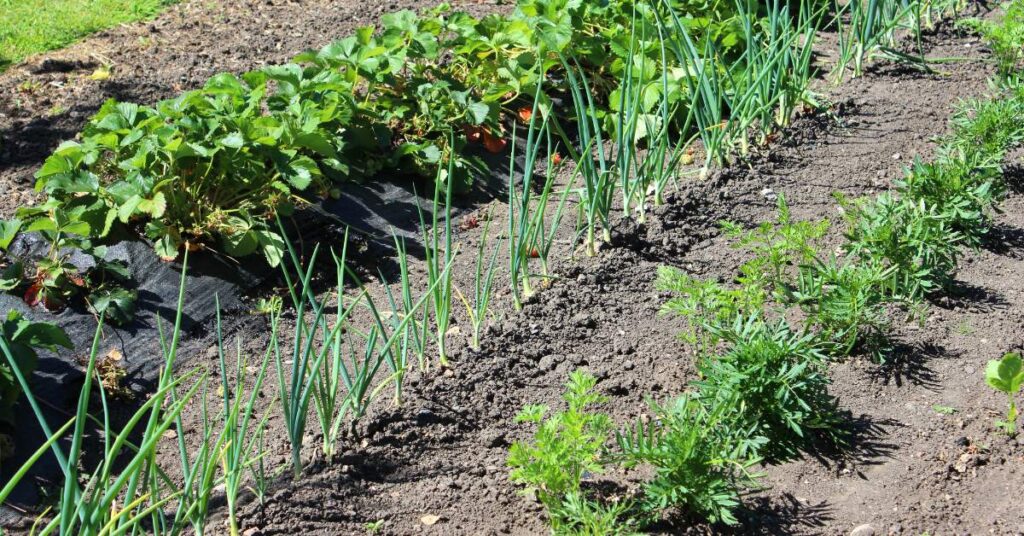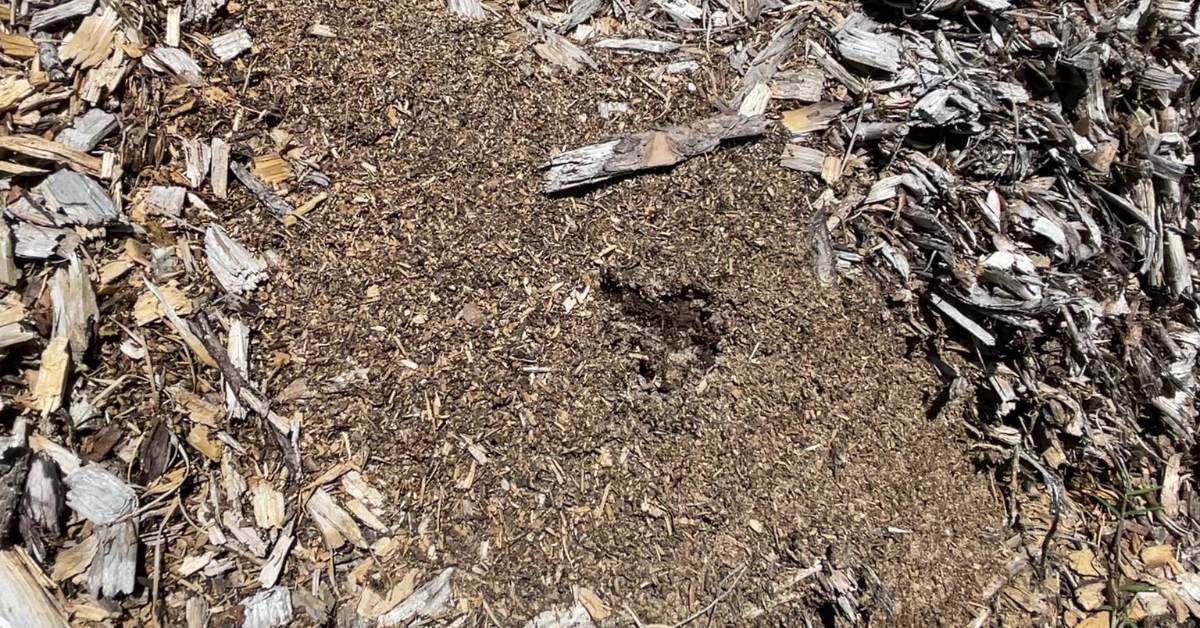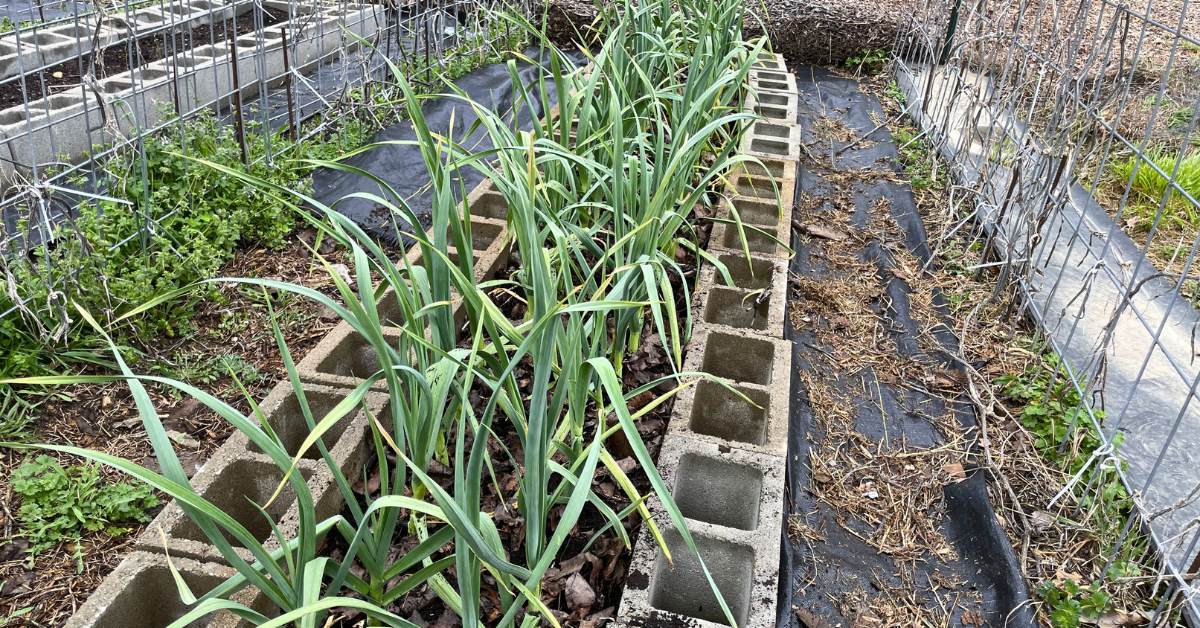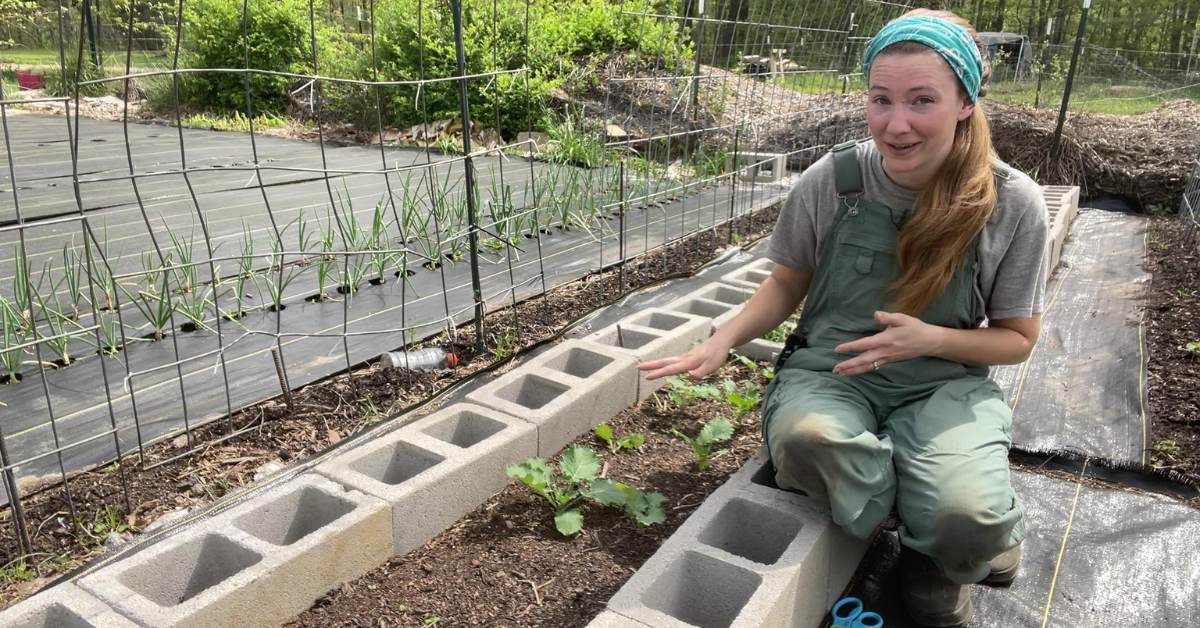The concept of companion planting is a tried-and-true method that enhances the health and productivity of crops.
Onions, with their versatile uses and importance in the kitchen, are no exception.
Knowing which plants work well with onions and which ones don’t can make a significant difference in your garden’s success.
Let’s discuss a few of these dynamic relationships between onions and their companion plants, highlighting the allies that support their growth and the adversaries that hinder it.
Why Companion Planting Works
Companion planting operates on the principle that certain plants offer mutual benefits when grown in close proximity.
For onion plants, this age-old practice works particularly well to fend off pests and bolster soil health.
In fact, thanks to their strong aroma, onions deter a wide variety of insect pests, making this root crop a strategic ally in the vegetable garden.
Best Companion Plants for Onions
When it comes to onions, some plants can complement their growth and help improve overall garden health. Here are seven companion plants for onions and why they are beneficial:

- Lettuce: Lettuce serves as a great companion plant for onions because it helps to maximize space in the garden. Lettuce grows relatively quickly and occupies the space between onion rows, providing ground cover that helps suppress weeds. Additionally, lettuce has shallow roots that won’t interfere with the deeper-rooted onions.
- Carrots: Carrots are often recommended as companions for onions because they help repel onion fly, a common pest that attacks onions. Interplanting onions with carrots can confuse pests and make it harder for them to locate their target plants. Plus, carrots and onions have different root depths, so they won’t compete for nutrients.
- Chives: Chives are close relatives of onions and share similar growing conditions. They can help deter pests like aphids and carrot rust fly, which may also affect onions. Chives also attract beneficial insects like pollinators, which can enhance onion pollination and yield.
- Beets: Beets are beneficial companions for onions because they have shallow roots that won’t interfere with onion growth. They also help to break up soil compaction and add organic matter when their leaves decompose. Additionally, beets can attract beneficial insects like predatory wasps, which prey on pests that may harm onions.
- Spinach: Spinach is a cool-season crop that can be planted alongside onions. Like lettuce, spinach grows quickly and provides ground cover, reducing weed growth around onions. Spinach also has shallow roots and won’t compete with onions for nutrients.
- Tomatoes: Tomatoes and onions make good companions because they have different pest enemies. Onions can help repel pests that commonly attack tomatoes, such as aphids, while tomatoes can deter pests that affect onions. Interplanting them can help maximize garden space and increase overall biodiversity.
- Marigolds: Marigolds are often used as companion plants for many vegetables, including onions. They contain compounds that repel nematodes, which can be harmful to onions. Marigolds also attract beneficial insects like ladybugs and hoverflies, which prey on onion pests like aphids.
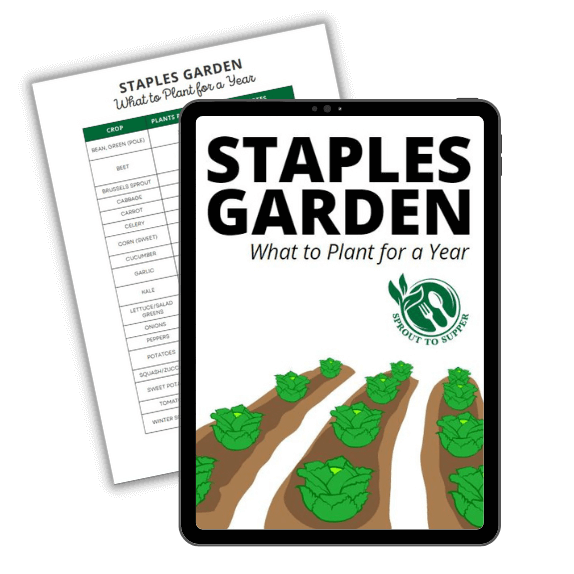
Dream of Filling Your Pantry with Homegrown Staples?
Plan your garden with our FREE PRINTABLE—Staples Garden: What to Plant to Feed Your Family for a Year!
What NOT to Plant Near Onions
Pairing your onions with certain crops could hinder rather than help your garden’s growth.
Plants with deep roots may compete aggressively for soil nutrients, leaving your onions lacking. Others can actually attract pests that would not only harm themselves but could pose a threat to your onions as well.
Here are five plants you should avoid planting near onions:
- Beans: Beans, including both pole and bush varieties, are not ideal companions for onions. They belong to the legume family and have high nitrogen-fixing capabilities. This means they can compete with onions for soil nutrients, particularly nitrogen, which onions need for bulb development. Planting beans near onions may result in stunted onion growth and reduced yields.
- Peas: Peas, like beans, are legumes that fix nitrogen in the soil. Planting peas near onions can lead to nitrogen competition, inhibiting onion growth and bulb development. Additionally, peas may attract onion pests such as onion thrips and onion maggots, which can further harm onion crops.
- Asparagus: Asparagus is another plant to avoid planting near onions. Asparagus has an extensive root system and can compete with onions for soil nutrients and water. Additionally, both onions and asparagus are susceptible to certain soil-borne diseases, so planting them together may increase the risk of disease spread.
- Cabbage Family (Brassicas): Plants in the cabbage family, including cabbage, broccoli, cauliflower, kale, and Brussels sprouts, should not be planted near onions. These brassicas release compounds that inhibit the growth of nearby plants, including onions. Planting onions near brassicas may result in reduced onion growth and flavor.
- Alliums (Other Onion Family Members): While onions themselves are compatible with most other plants, it’s generally best to avoid planting different members of the Allium genus near each other. This includes garlic, shallots, leeks, and chives. Planting these plants together can increase the risk of disease spread, as they are susceptible to similar pests and diseases.
Using Aromatic Herbs to Your Advantage
Aromatic herbs can play a vital role as companion plants for onions and enhance your entire garden.
Their strong scents, such as those found in basil, thyme, and rosemary, can help repel pests like aphids and onion flies, protecting your onion crops naturally.
Herbs like lavender, mint, and dill attract beneficial insects that pollinate onion flowers and prey on garden pests.
Intercropping these herbs with onions not only provides pest protection but also contributes to soil improvement as they typically don’t compete for the same nutrients in the soil as onions.

Simplify the Seed-to-Table Process
Create and track your custom, seed-to-table plan—with guidance from seasoned gardeners & preservers—inside the Sprout to Supper Planner.
Companion Planting Tips and Tricks
Successful companion planting with onions requires mindful strategies. You’ll definitely want to keep in mind the spatial needs of different crops.
Onion sets and their companions shouldn’t compete for space, so adequate spacing is important.
Provide plenty of room for both onions and their companions to flourish, accommodating their shallow roots and low growth habit.
You’ll also want to implement crop rotation wisely.
This practice prevents soil depletion and curbs pest accumulation, ensuring each plant family benefits from altered growing conditions year after year.
Frequently Asked Questions
What should you not plant after onions?
After growing onions in a certain spot, avoid planting other members of the Allium genus, which includes garlic, shallots, leeks, and chives.
This practice helps prevent the buildup of soil-borne diseases and pests that specifically target Allium crops.
By rotating crops and avoiding planting Alliums in the same spot consecutively, you can reduce the risk of disease transmission and maintain soil health.
What not to plant with garlic and onions?
These pungent plants do not play well with all garden companions. Distinct plant families, due to unique nutrient demands and root systems, could cause conflict or even harm when grown together with these alliums.
Plants from the legume family, such as beans and peas, can especially struggle in the proximity of garlic and onions. This is primarily because the sulfur compounds exuded by alliums can inhibit the growth of these legumes.
The soil structure and bacterial environment necessary for legumes to thrive get disrupted by the presence of heavy allium planting.
As a result, your yield from beans or peas might significantly decline if they are too close to these aromatic bulbs.
Can you plant onions next to bell peppers?
Thankfully, onions and bell peppers thrive in close proximity. This partnership benefits greatly from the onion’s ability to repel certain pests, such as spider mites and aphids, which often trouble pepper plants.
As onions emit their potent smell, insects that might otherwise feast on bell pepper leaves tend to keep their distance.
Also, onions—with their shallow roots—do not compete with bell peppers for nutrients. However, they are both heavy nitrogen feeders, so you will need to amend your soil and/or fertilize the area with extra nitrogen.


